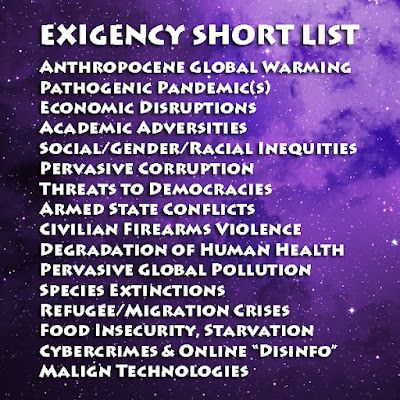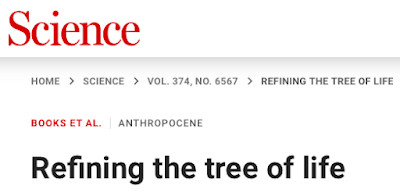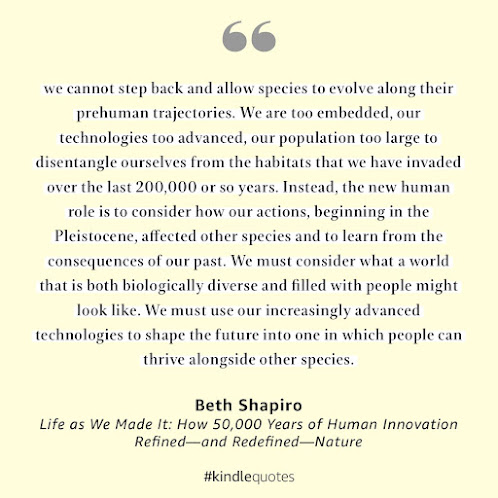Added one to my exigencies list.
Yeah, and, again, lots of recursive cause/effect overlap in the foregoing, some of it probably transient. But, a lot of it likely increasing in adverse intensity.
Mulling over adding Fentanyl (etc) to the list (lethally dangerous addictive intoxicants). Might it warrant its own category line item? Or would it suffice to just be implicitly subsumed under Degradation of Human Heaith?
"Malign technologies?" See, for one recent example, my prior post on "synthetic media / deep fakes." I see a decided skew on the "malignancy vs. beneficence" relative potential balance beam. What of "Artificial Intelligence" more broadly? Applications of genomics?
Yeah, blah, blah, blah, "technology is morally neutral." Right.
___
Whenever my Science Magazine arrives, I typically head straight for the book reviews.
Found this yesterday.
Since humankind’s first migration out of Africa, we have trimmed, trained, and reshuffled the tree of life at breakneck speed. In the past 10,000 years, we learned to manipulate the basic building blocks of life through breeding. In the past century, we increased the speed and magnitude of our impact through mass global transportation, industrialized agriculture, and urbanization. In the past decade, we have seen major advances in biotechnology that now allow us to directly rewrite the genetic code of almost any organism to create never-before-seen biological variation.
Our unmatched ability to destroy, reshape, and rebuild life to suit our purposes has allowed our species to become an evolutionary force rivaled only by the five major mass extinctions of Earth’s past. Evolutionary biologist Beth Shapiro explores this legacy in her new book, Life as We Made It.
In eight chapters, Shapiro takes readers on a succinct and compelling journey through historical events, inventions, and decisions that have forever changed the course of life on Earth…
Shapiro’s latest literary work makes plain that human intervention will likely be necessary to confront the problems we currently face and that biotechnology has an important role to play across a range of issues, from saving species teetering on the brink of extinction to curing disease to feeding a growing human population…
In what is perhaps the greatest accomplishment of Life as We Made It, Shapiro clearly articulates key questions whose answers will define how we think about and use the power we now yield. In a world that has been remixed and remade by humans several times over, what is “natural”? When and how should we intervene in evolution? Who should make this call?…
In a world where we can engineer life in much the same way we engineer skyscrapers, we are bounded more by imagination than by ability. But while buildings will eventually deteriorate in the sands of time, life will keep on ticking. In Life as We Made It, Shapiro offers readers a history lesson from which to pull both caution and inspiration. In doing so, she sets the table for a needed conversation about our lasting imprint on the tree of life. It is up to us to take a seat.
It's customary in Science book reviews to give 'em the venerable "Praise-Criticism-Praise Sandwich" workover.
Not one disparaging word about this book. Hmmm... "Purchase instantly with 1-Click."
And Off We Go...
THE LAST DECADE HAS SEEN DEVELOPMENT OF POWERFUL BIOTECHNOLOGIES that are at the same time astonishing, encouraging, and pretty scary. Cloning, genome editing, synthetic biology, gene drives—these are words and phrases that promise a different kind of future, but is it a welcome future? On the one hand, technological advance is a good thing. Biotechnology stops us from getting sick, cures diseases that we already have, and makes our food taste better and stay fresh longer. On the other hand, biotechnology creates things that feel weirdly unnatural, like corn with embedded bacterial genes and chickens that lay eggs out of which ducklings hatch.1 In fact, it is increasingly difficult to find anything that hasn’t been sullied by people in some way. And while scientists race to protect the natural things and spaces that remain, crises like offshore oil spills, rising extinction rates, and emerging infectious diseases demand solutions beyond what our existing technologies can achieve. Should we dig in, embrace the power of modern science, and look ahead to a future where bacteria clean up our messes and where hairy elephants roam Siberian fields while sterilized mosquitoes buzz overhead? Or should we resist this future and stop messing with things before it is too late?Stay tuned. Interesting person. Very impressive.
For many, a future filled with human-modified plants and animals is bleak. Engineered microbes, mammothified elephants, and mosquitoes that can’t transmit disease would probably benefit people in some way, but creating them just isn’t right, and a world that includes them is somehow false. To those who feel this way, there is a tendency to blame science. Thanks to scientists and their twenty-first-century technologies, our world is on the precipice of a metamorphosis beyond which lies a new nature, one created entirely by and for people, and one that is anything but natural. This nervous narrative assumes, however, that humans have only just begun to meddle with nature—that the border between natural and unnatural is obvious and unblurred. History, however, and archaeology and paleontology and even genomics, tells a different story. In studying the past, we learn that people have been shaping the evolution of the living things around us throughout our history. Within the last 50,000 years, our ancestors hunted, polluted, and outcompeted hundreds of species to extinction. They turned wolves into Boston terriers, teosinte into popcorn, and wild cabbage into kale, broccoli, cauliflower, brussels sprouts, and collard greens (to name a few). As our ancestors learned to hunt, to domesticate, and to travel, their actions and movements created opportunities for species to adapt and evolve. Some species survived their encounters with humans, but many did not, and all were transformed in some way. Living things today are as we made them, shaped in part by the randomness of evolution and in part by less random human intent…
Shapiro, Beth. Life as We Made It (pp. 9-11). Basic Books. Kindle Edition.
Over the last 50,000 years, we transformed the plants and animals with which we share our planet into lineages that are exquisitely adapted to today’s world, where the dominant evolutionary force is us.__________
We are, however, a different kind of evolutionary force. Evolution is a random walk through experimental space. Evolution does not evaluate risk before making decisions about which breeding experiments to perform, but we do. Evolution doesn’t care what the next generation looks like or even if the next generation survives, but we do. Evolution is not guiding horses or wheat or cattle or bison to any particular fate, but we are. And this is where the contradiction in our opposition to our biotechnologies is laid bare. We resist biotechnologies precisely because they give us the control over evolution that humans have continuously worked to achieve. Evolution will not get us to a future that we predetermine. Our biotechnologies, however, can.
The decisions that we make over the next decades will determine our own fate and the fate of other species, perhaps far into the future. We can choose to take advantage of our technologies as they develop, to use synthetic biology to make even more with less, to protect wild species and wild spaces, and to do so in a sustainable way. Or we can reject our new biotechnologies and follow this same path anyway, just more slowly and with less success.
Biotechnologies can be frightening, in particular when they are new. We still have lots of work to do to make our technologies safe, to learn how to assess risk, to collaborate at a global scale. But biotechnologies also give us reason to be hopeful. The world is changing, and people and animals and ecosystems are suffering. Biotechnologies give us the power to help. We can change the evolutionary trajectories of species destined to become extinct. We can clean up our trash and make our farms more efficient. We can cure diseases that afflict us and other species. We can create and sustain a world in which wild species thrive in natural spaces and where people are healthy and happy and decidedly in charge. [Beth Shapiro, pp. 313-314]






No comments:
Post a Comment